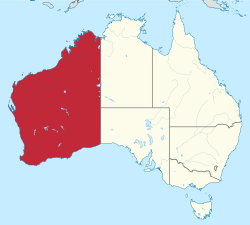Top Qs
Timeline
Chat
Perspective
Trithuria bibracteata
Species of aquatic plant From Wikipedia, the free encyclopedia
Remove ads
Trithuria bibracteata is a species of aquatic plant in the family Hydatellaceae endemic to Western Australia.[1]
Remove ads
Description
Vegetative characteristics
Trithuria bibracteata is a small, annual, aquatic herb[2] with simple, linear, 5-20 mm long, and 0.4 mm wide leaves.[3] The red plants are 1 cm wide,[4] and max. 2 cm high.[3] The short stem bears max. 2 mm long hairs.[4]
Generative characteristics
It is monoecious,[3] and the reproductive units ("flowers") are bisexual.[5] The reproductive units are sessile,[4] or pedunculate.[6] The reproductive unit consists of two lanceolate, 2-3 mm long, and 1.2 mm wide involucral bracts, 1-2 stamens, and 6-10 carpels.[4] The dehiscent fruit[3] bears 0.4-0.6 mm long,[4] desiccation-tolerant,[7] black to brown,[8] ellipsoid to ovoid seeds,[3] which require light to germinate.[9][10] Flowering occurs from September to November.[2][3]
Remove ads
Distribution
It occurs in the Southwest region of the state Western Australia.[2][3]
Taxonomy
It was described in 1983 as Trithuria bibracteata Stapf ex D.A.Cooke by David Alan Cooke based on previous work by Otto Stapf.[1][4] The type specimen was collected by R. D. Royce in Boyanup, Western Australia in 1947.[4] It is placed in Trithuria sect. Trithuria.[11]
Etymology
The specific epithet bibracteata is derived from the prefix bi- meaning two,[12][13] and -bracteata meaning "with bracts".[14][15] The reproductive units have two bracts.[4]
Conservation
It is not threatened.[2]
Ecology
Habitat
It occurs in clay and mud along stream edges,[2] ephemeral pools,[16] and swamps.[8][9] It inhabits winter-wet habitats,[2][9] which dry in the Australian summer from December to February.[9] It can occur sympatrically with Trithuria occidentalis.[17]
Seed dispersal
The desiccation-tolerant seeds[7] may be dispersed by water birds.[10]
References
Wikiwand - on
Seamless Wikipedia browsing. On steroids.
Remove ads

